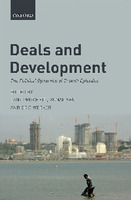Deals and Development
The Political Dynamics of Growth Episodes
| dc.contributor.editor | Werker, Eric | |
| dc.contributor.editor | Sen Lant Pritchett, Kunal | |
| dc.date.accessioned | 2017-11-01 23:55:55 | |
| dc.date.accessioned | 2018-10-03 09:09:28 | |
| dc.date.accessioned | 2020-04-01T13:21:40Z | |
| dc.date.available | 2020-04-01T13:21:40Z | |
| dc.date.issued | 2017 | |
| dc.identifier | 640293 | |
| dc.identifier | OCN: 988170210 | en_US |
| dc.identifier.uri | http://library.oapen.org/handle/20.500.12657/31035 | |
| dc.description.abstract | "International financial crises have plagued the world in recent decades, including the Latin American debt crisis of the 1980s, the East Asian crisis of the late twentieth century, and the global financial crisis of 2007-09. One of the basic problems faced during these crises is the lack of adequate preventive mechanisms, as well as insufficient instruments to finance countries in crisis and to overcome their over-indebtedness. Resetting the International Monetary (Non)System provides an analysis of the global monetary system and the necessary reforms that it should undergo to play an active role in the twenty-first century and proposes a comprehensive yet evolutionary reform of the system. Criticising the ad hoc framework- a ""(non)system""- that has evolved following the breakdown of the Bretton Woods arrangement in the early 1970's, Resetting the International Monetary (Non)System places a special focus on the asymmetries that emerging and developing countries face, analysing the controversial management of crises by the International Monetary Fund and proposing a consistent set of reform proposals to design a better system of international monetary cooperation. Policy orientated and structured to deal in a sequential way with the issues involved, it suggests provision of international liquidity through a system that mixes the multicurrency arrangement with a more active use of the IMF's Special Drawing Rights; stronger mechanisms of macroeconomic policy cooperation, including greater cooperation in exchange rate management and freedom to manage capital flows; additional automatic balance-of-payments financing facilities and the complementary use of swap and regional arrangements; a multilateral sovereign debt workout mechanism; and major reforms of the system's governance." | |
| dc.language | English | |
| dc.subject.classification | thema EDItEUR::J Society and Social Sciences::JP Politics and government | en_US |
| dc.subject.classification | thema EDItEUR::K Economics, Finance, Business and Management::KC Economics | en_US |
| dc.subject.classification | thema EDItEUR::K Economics, Finance, Business and Management::KC Economics::KCG Economic growth | en_US |
| dc.subject.classification | thema EDItEUR::K Economics, Finance, Business and Management::KC Economics::KCM Development economics and emerging economies | en_US |
| dc.subject.classification | thema EDItEUR::K Economics, Finance, Business and Management::KC Economics::KCP Political economy | en_US |
| dc.subject.other | economics | |
| dc.subject.other | monetary economics | |
| dc.subject.other | Ghana | |
| dc.subject.other | Gross domestic product | |
| dc.subject.other | Liberia | |
| dc.subject.other | Malaysia | |
| dc.subject.other | Thailand | |
| dc.subject.other | Uganda | |
| dc.title | Deals and Development | |
| dc.title.alternative | The Political Dynamics of Growth Episodes | |
| dc.type | book | |
| oapen.identifier.doi | 10.1093/oso/9780198801641.001.0001 | |
| oapen.relation.isPublishedBy | b9501915-cdee-4f2a-8030-9c0b187854b2 | |
| oapen.relation.isFundedBy | 99e7022b-b034-49a7-9097-b72e4d04046f | |
| oapen.relation.isbn | 9780198801641 | |
| oapen.pages | 400 | |
| oapen.grant.number | PO 5113 | |
| oapen.grant.acronym | The Effective States and Inclusive Developmen | |
| oapen.remark.public | Relevant Wikipedia pages: Economic growth - https://en.wikipedia.org/wiki/Economic_growth; Ghana - https://en.wikipedia.org/wiki/Ghana; Gross domestic product - https://en.wikipedia.org/wiki/Gross_domestic_product; Liberia - https://en.wikipedia.org/wiki/Liberia; Malaysia - https://en.wikipedia.org/wiki/Malaysia; Thailand - https://en.wikipedia.org/wiki/Thailand; Uganda - https://en.wikipedia.org/wiki/Uganda | |
| oapen.identifier.ocn | 988170210 |

